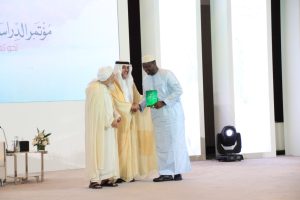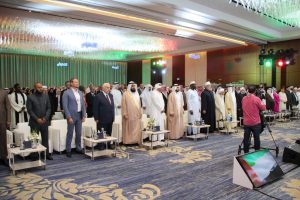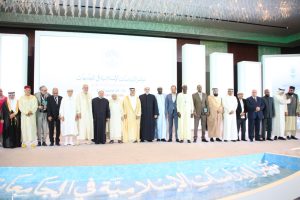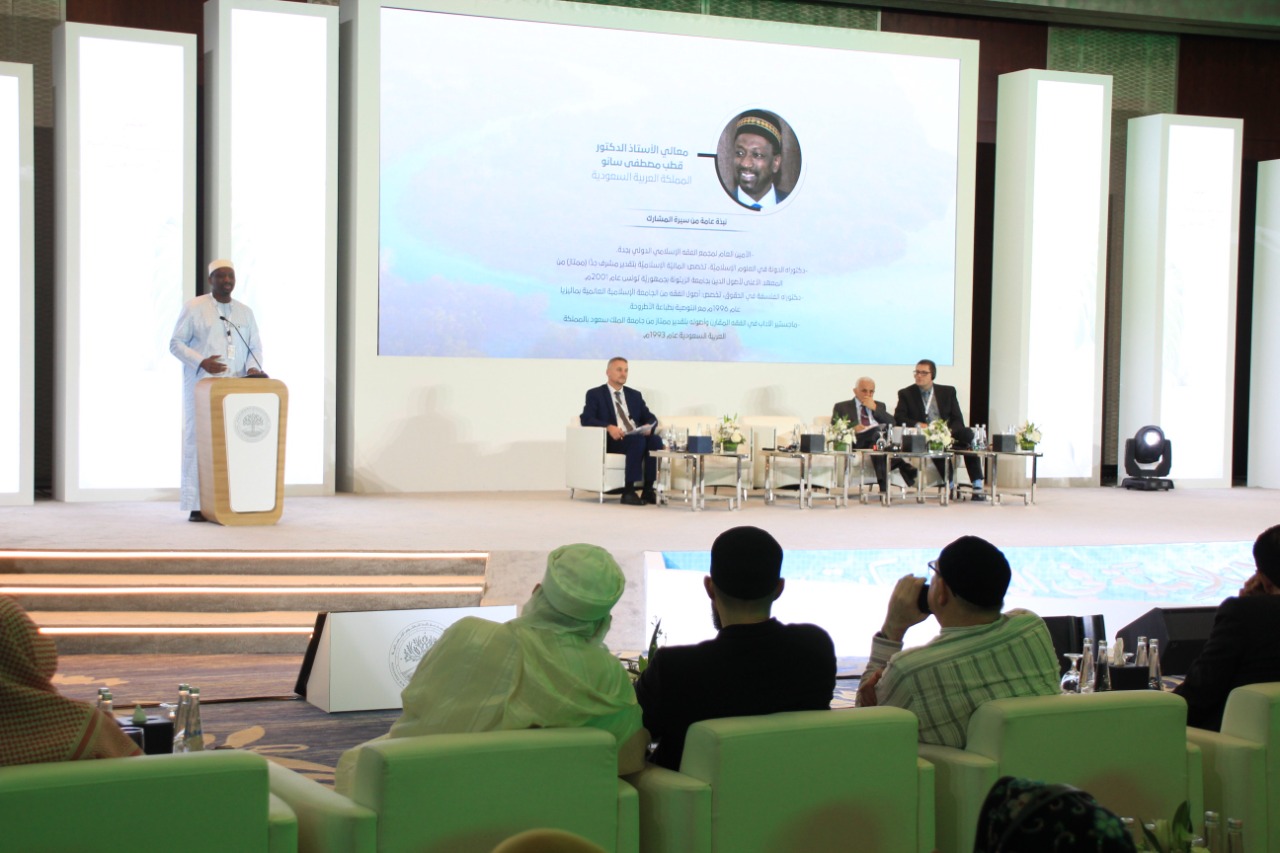
His Excellency Prof. Koutoub Moustapha Sano, Secretary General of the International Islamic Fiqh Academy (IIFA), participated in the second scientific conference of the College of Islamic Studies at Mohamed bin Zayed University for Human Sciences, entitled “Islamic Studies in Universities: Towards Promoting the Values of Citizenship and Coexistence,” from 28-30 Rabi’ al Thani 1444H, corresponding to 22-24 November 2022G, in the UAE capital, Abu Dhabi.
A number of the best scholars, professors and researchers from inside and outside the United Arab Emirates participated in the conference, highlighting the importance of the role that Islamic studies play in educational institutions in preserving the authenticity of religious discourse and developing Shariah sciences in a way that qualifies them to contribute to the movement of development, renewal, and modernization. In its current session, the conference deals with six axes, including: Islamic studies… vision and content, Islamic studies and research and teaching methods, rebuilding Islamic sciences in Arab universities, Islamic studies and knowledge integration, and finally Islamic studies and promoting the values of coexistence and citizenship.
His Excellency the Secretary General participated in the main scientific session of the first day of the conference within the theme of “Islamic Studies: Vision and Content” with a lecture entitled “Islamic Studies and Modernizing the Religious Lesson“. At the beginning of his intervention, His Excellency extended his thanks and appreciation to the leadership of the university for organizing and holding this important conference and for well choosing its title, praising the major scientific achievements accomplished by this promising university in a record period of its establishment, wishing it more brilliance and success, and the United Arab Emirates, leadership and people more progress, prosperity and perpetual security and safety.
Then His Excellency defined the religious lesson as “A human thought produced by Muslim minds aiming to achieve a link between the revelation and the changing and evolving reality, influenced by the social and cultural circumstances and the apparent economic and political conditions that affected the Islamic reality starting with those major changes and major events that had a clear impact on the Islamic reality after the death of the Prophet, may God’s prayers and peace be upon him, and going through those great developments that took place in Islamic life on the eve of the Islamic Ummah’s contact with nations with ancient intellectual civilizations such as the Persians, Byzantines, Pharaohs and others, and ending with the successive challenges that continue to afflict reality to this day”. His Excellency explained that there are “many generations of predecessors and successors from different scientific backgrounds, and various intellectual starting points in successive times, followed in formulating and refining this lesson, and therefore it was not surprising that its content was a combination of ijtihad and choices that were made by those generations in doctrinal issues (= Al Mutakalima), Fiqh issues (= Al Mutafaqiha), and educational issues (= the Sufis), all affected in their quest by their prevailing social and cultural conditions, and by their existing economic and political conditions”. His Excellency pointed out that “the Islamic thought that produced the religious lesson was, before the ages of imitation, a lively and moving thought that welcomed every new and useful thing and was open to every wise and rational incoming. Therefore, it is not surprising that this religious lesson is a rich text that includes the facts of all intellectual debates that the intellectual arena witnessed one day between Muslims and people of other religions, and it is not surprising to also to find debates between those known in history as the Sunnis and the Shiites on the one hand, and between the Mu’tazila and the Sunnis on the other hand. In this abundant lesson, the reader will be aware of the heated debate between the sects of Sunnis, such as the Ash’aris, Maturdiyya, Murji’ah and Ahl al-Hadith, and between the Shi’ite sects of Zaydiyyah, Twelver Imamiyyah and Ismailis. And the examiner will also find an honest record of the Fiqh differences that the Fiqh arena also witnessed between the Sunni and Imami schools of thought on the one hand, and between the Sunni sects of the Hanafi, Maliki, Shafi’i, Hanbali, and Dhahiri schools on the other hand; And between the sects of the Imami sects of Jaafari and Zaydi on the third side; And in addition to this, it contains a faithful documentation of the the educational skirmishes between the Sufis and other people of the Qibla on the one hand, and between the sects of the Sufis with each other on the other hand.”
Then His Excellency pointed out that “to enable the religious lesson today to provide rational guidance for the existing social and cultural conditions, and an honest settlement of the prevailing economic and political conditions requires a filtering of its issues, a revision of its topics, and then an addition to its fields. And by deciphering its issues, we mean the responsible dispensation of attention to the whole doctrinal, Fiqh and educational issues that there is no longer a need to pay attention to, considering that they are purely circumstantial historical issues that disappeared with the disappearance of the social and cultural conditions and the economic and political conditions that contributed to their formation and emergence. By revising its topics, we also mean the obligation to distinguish between fundamentals, branches, constants, and variables in doctrinal, Fiqh, and educational content, and to avoid confusion between them. And we mean by adding areas to its content, including it and grafting it with the calamities and challenges of the era, in order to root it, edit it, and direct it”. And to achieve this, it is necessary to “enhance awareness among young people first that every opinion or thought that confiscates or contradicts the provisions of the texts and the authentic prophetic experience must be bypassed and dispensed with entirely, and secondly to enhance their awareness that what unites people in general and worshipers in particular is more and greater than what separates them, and thirdly to enhance their awareness of the impact of social and cultural conditions, economic and political conditions on those events that the Islamic arena has known throughout history, and those conditions have disappeared and changed. Therefore, the contemporary reality does not need to be preoccupied with it, and to hold non-participants responsible for its consequences and effects, but to take it as a basis for controlling the relationship that should prevail between peoples and nations on the one hand, and between the worshipers themselves on the other hand.”
His Excellency concluded by calling upon the conference to adopt three methodological pillars to update the doctrinal content of the religious lesson from ideas and concepts that prevent the promotion of the values of coexistence and tolerance. The first pillar is represented in resorting to the provisions of the texts and the prophetic experience with regard to the Muslim’s relationship with his God, his society, and the world around him, far from the fragmentary considerations within the Book and the Sunnah that were mentioned in the case of non-Muslims in general, and in the case of the People of the Book in particular, and to prevent the confiscation of many ambiguous texts based on interpretations outside the context and the reasons for revelation, and from striking the religious texts against each other without paying attention to the gradual approach and the solicitation on which these texts are based, and at the same time preventing the irresponsible and inaccurate employments of many clear Shariah terms with specific concepts, and with known and clear historical contexts, and on top of those terms: the term loyalty and disavowal, jihad, safety, governance, and ignorance, disbelief, tribute, guardianship, and so on.
Accordingly, it is necessary to enhance awareness of the fact that the Shariah rulings related to security, safety, peace, jihad, administration, leadership, governance, and the judiciary are government rulings that individuals are not addressed with, and they are not concerned with, nor responsible for them, and awareness of the multiple and different levels of the actions of the great Prophet, including his actions as a prophet, his actions as an imam and ruler, his actions as commander-in-chief of the armed forces, his actions as a judge, and his actions as a mufti..etc… The second methodological focus is represented in overcoming the repetitive and automated narration of the prevalent historical differences and conflicts between Islamic sects, both of which are those that occurred during the occurrence of sedition between the companions, so people were divided into Sunnis, Kharijites, and Shiites, or were those differences that erupted between worshipers during the Umayyad, Abbasid, and Seljuk dynasties, so people were divided into Sunnis and Mu’tazila, then into Sunnis and Ahl al-Hadith, or those historic differences that took place between the people of hadith and the people of taste, acclamation, and others.
These and other differences are purely historical differences that arose among the people of the nation as a result of social and cultural conditions that have passed and vanished, and because of economic and political conditions that have become extinct and ended. Therefore, there is no need to repeat them to the young, rather it is appropriate to assure them that they are not responsible for what happened, because they did not live with those conditions that these events arose because of them, and they were not parties to them. Therefore, it is better for them to pay attention to their existing social and cultural conditions, and focus on their prevailing economic and political conditions, in order to provide guidance, settlement, and rationalization.
As for the third methodological pillar, it is represented in serious and responsible work in order to remove the difference in doctrinal and educational issues from the circle of truth and falsehood into the circle of right and wrong, and to avoid employing the terms “people of desires, people of misguidance, and people of heresy” in describing those who are different in doctrinal and educational issues ; Similar to the difference in Ijtihad in Fiqh issues, where the jurists refrain from describing their opponents with those mentioned descriptions. In this way, extremists are prevented from disbelieving the monotheists, chasing the worshipers, and blowing up the prostrators. It also prevents the terrorist groups from taking it as a large oasis in which they roam in order to desecrate the infallible blood, violate the guarded honors, and annihilate the preserved property, and it stops all the agitators and the so called learned from infiltrating through it to accuse individuals, rulers, scholars, societies, and states.
And our basis for this is the saying of the Prophet, who divided the mujtahids in diligent matters into right and wrong, and allocated two rewards for the correct one, the reward for diligence and the reward for getting right, and for the wrong one only one reward. This saying did not differentiate between the mujtahids in doctrinal and educational issues and the mujtahids in Fiqh matters, which makes the distinction between them questionable.

Read Also
Lastest








